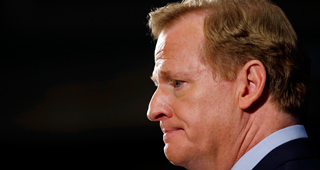The NFL has backed out of one of the most ambitious studies on the relationship between football and brain disease.
The seven-year, $16 million initiative was to be funded out of a $30 million research grant the NFL gave the National Institutes of Health in 2012. The NFL has said repeatedly that it has no control over how that money is spent, but the league balked at this study, sources said, because the NIH awarded the project to a group led by a prominent Boston University researcher who has been critical of the league.
In a news release announcing the study Tuesday morning, Boston University said the NIH would pay for the project but made no mention of the NFL.
Asked why the NFL did not want to fund the study, NFL spokesman Brian McCarthy on Monday referred questions to the NIH, writing in an email: "The NIH makes its own funding decisions." On Tuesday, McCarthy tweeted that the story was "wrong."
The NFL's decision not to fund the Boston University CTE study delayed its announcement for months, and the issue ultimately reached the office of NIH director Dr. Francis S. Collins, according to sources. As late as this week, some officials held out hope the league would change its mind, but the NIH remained committed to funding the project regardless.
"This problem is larger than the NFL," said Dr. Walter Koroshetz, director of NIH's National Institute of Neurological Disorders and Stroke. "We're trying to get answers for people. There are a lot of concerned people out there, especially parents of kids."
The NFL made an "unrestricted" $30 million gift in 2012 and the announcement said it came "with no strings attached."


